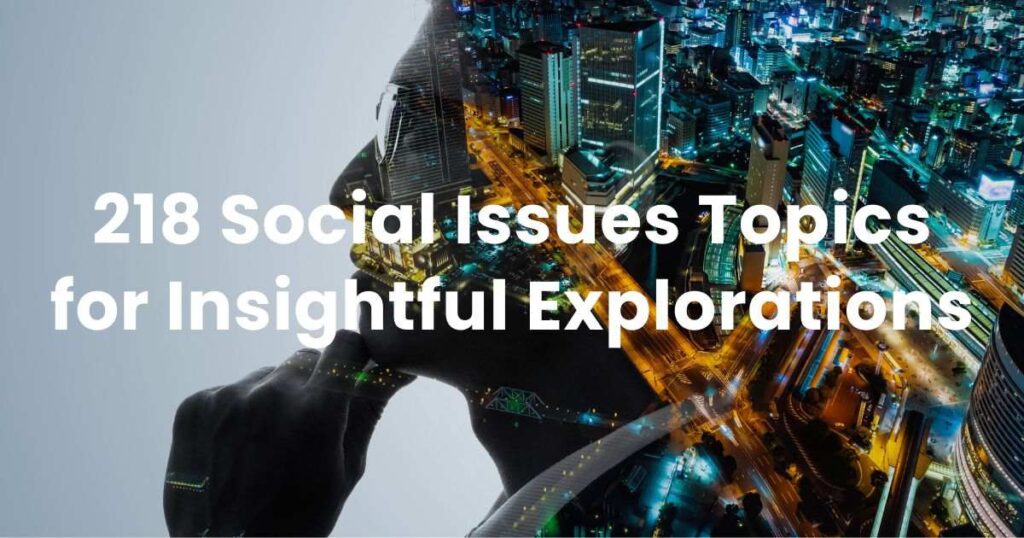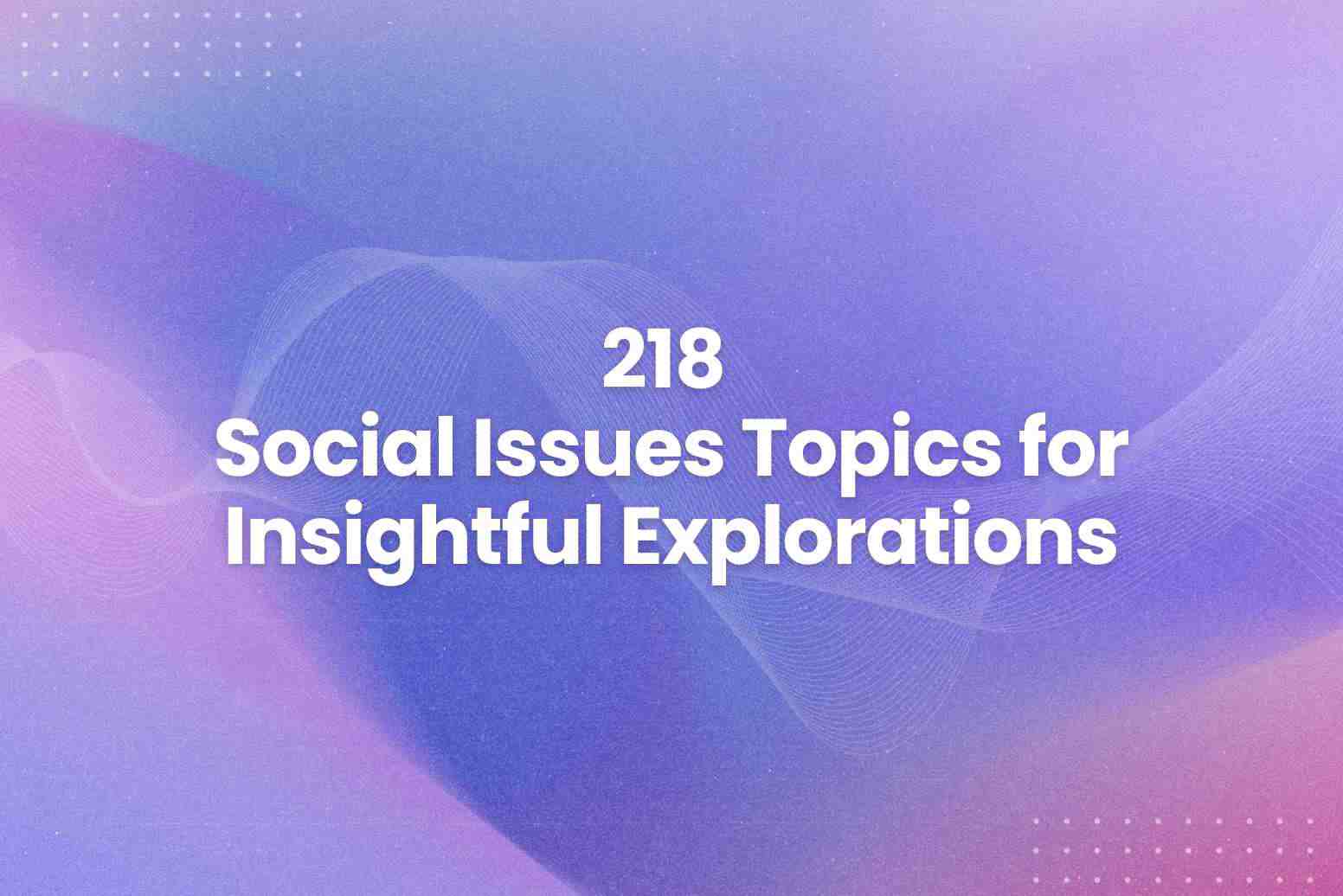Social issues essay topics refer to current events that have an impact on society as a whole. In a rapidly changing world, social issues dominate current conversation, influencing our communities, politics, and global connections. Thus, social issues topics can foster personal growth, broaden horizons, and serve as a platform to initiate dialogue and action on pressing problems or challenges in the global community. In this blog, we explore a list of critical social issues topics, encouraging a deeper understanding and motivating collective efforts for change.
And also, you can explore our AI writing tool to help you deal with more social issues. Arvin is more than just an AI assistant; it’s a valuable companion for those willing to explore critical social issues.
Also read: 290 Top Sociology Topics & Tips for Effective Research

What Are Social Issues
Social issues are problems that affect a significant number of individuals within a society and often involve conflicting values or interests. They can arise from various social, economic, political, and cultural factors and typically require collective action or policy changes to address. Here are some key characteristics of social issues:
Characteristics of Social Issues
- Impact on Society: They affect large groups of people and can have widespread implications on communities and social structures.
- Controversial Nature: Social issues often involve disagreement and controversy, as different individuals and groups may have opposing views on how they should be addressed.
- Systemic Problems: Many social issues are rooted in broader systemic problems, such as inequality, discrimination, or economic injustice.
- Need for Action: Social issues often require policy responses, activism, community engagement, and advocacy to bring about change.
Best Social Issues Topics
- Racial Profiling and Its Impact on Modern Society
- Addressing Gender Inequality in the Workplace
- Implications of Cyberbullying in the Digital Age
- The Effect of Mass Media on Body Image
- Balancing Privacy Rights and National Security in Surveillance
- Modern-Day Human Trafficking: A Hidden Crime
- Climate Change: Examining Environmental Racism
- Immigration Policies: Social and Economic Impacts
- Cultural Appropriation in Fashion and Entertainment
- Violence in Video Games: Correlation to Real-World Aggression
- Youth Unemployment: A Rising Social Issue
- Religious Freedom vs. Societal Safety: The Thin Line
- Universal Basic Income: Solution for Poverty?
- Decriminalizing Drugs: The Portuguese Model
- Impacts of Technological Advancements on the Job Market
- Examining the Glass Ceiling Phenomenon
- Body Shaming: A Social Media Issue
- Exploring Mental Health Stigma in Society
- Consumerism and Its Effect on Climate Change
- Evaluating LGBTQ+ Rights Across Different Cultures
- Dissecting the Prison Industrial Complex in the US
- Effects of Single-Parenting on Child Development
- Social Implications of Genetically Modified Organisms
- Income Inequality: Impacts on Health and Longevity
- Discrimination in the Housing Market: A Hidden Problem
Easy Social Issues Topics
- Economic Consequences of Child Labor
- Substance Abuse: A Social or Medical Issue?
- Ageism and Its Impact on Employment Opportunities
- Cybersecurity Threats: A Growing Social Concern
- The Digital Divide: Rural vs. Urban Internet Access
- Social Impacts of Modernization on Indigenous Communities
- Stigmatization of Sex Work: Society’s View and Legal Status
- Animal Rights: Ethical Concerns Surrounding Factory Farming Influence of Television on Children’s Behavioral Development
- Political Corruption: Effects on Social Trust and Development
- Internet Addiction: A 21st Century Mental Health Issue
- Food Deserts: Addressing Urban Nutritional Inequality.
- Child Obesity: The Role of School Meals
- Modern Slavery: A Global Issue Hidden in Plain Sight
- Understanding the Roots of Homelessness in Developed Countries
- Food Insecurity in First-World Nations: Causes and Consequences
- Influence of Social Media on Political Polarization
- Effects of Fast Fashion on Third-World Workers
- Assisted Suicide: Ethical Dilemma or Human Right?
- Transgender Rights in Sports: A Critical
- Terrorism and Its Impact on Social Cohesion
- Stereotypes and their Influence on Criminal Justice
- Understanding Social Exclusion in Public Schools
- Internet Censorship: Freedom of Speech vs. National Security
- Affordable Housing Crisis and Its Social Imp
- GMOs: A Solution for World Hunger or an Ecological Disaster?
- Social and Economic Impacts of Automation on Manufacturing Jobs
- Cultural Relativism: Understanding Human Rights Across Different Societies
- Privacy Issues Arising From Facial Recognition Technology
Interesting Social Issues Topics
- Income inequality and its impact on modern society.
- The role of social media in shaping public opinion and activism.
- Mental health stigma and its effects on individuals and communities.
- The challenges faced by refugees and their integration into new societies.
- The impact of technology on interpersonal relationships.
- Gender inequality and the fight for gender equity.
- The effects of climate change on vulnerable communities.
- The basic ethical principles of genetic engineering and human enhancement.
- The impact of globalization on cultural identity.
- The role of education in reducing poverty and social inequality.
- The criminal justice system and its approach to rehabilitation versus punishment.
- The implications of automation and artificial intelligence on employment.
- The impact of media portrayal on body image and self-esteem.
- The effects of racial discrimination and strategies for achieving racial equality.
- The challenges and opportunities of multiculturalism in contemporary society.
Social Issues Topics Related to Social Media
- Should social media platforms ban the spread of fake information?
- To what extent is social media dependency harmful?
- Is it appropriate for employers to monitor their employee’s social media accounts?
- The ethical considerations of businesses using Facebook accounts.
- How does cancel culture impact mental health?
- The dynamics of cyberbullying: understanding the roles of the victim and the abuser in online environments.
- Should children be permitted to have social media accounts?
- What is your opinion on memorial pages for the deceased on social networks?
- Tips for staying safe while using the internet.
- Is modern society placing pressure on individuals to participate in social networking?
Social Issues Topics Related to Health
- Is enough attention being paid by employers to the mental health of their employees?
- If a person cannot afford medical treatment, what options do they have?
- What are the reasons for higher obesity rates in some countries compared to others?
- Can tobacco advertising be outlawed to lower the number of smokers? Discuss this issue.
- How effective are psychoactive drugs in treating psychological diseases?
- What impact does disability have on one’s social standing? Talk about the stigma that people with impairments experience.
- Does gender play a crucial role in determining one’s health?
- What are the major health issues affecting African Americans and Hispanics?
- Discuss the expectations and challenges faced by child-free women in a society that is predominantly kid-centered.
- What are the arguments for and against the contemporary issues in nursing?
Peace and War Topics
- Causes and origins of the Russia-Ukraine war: Explore the underlying factors that led to the outbreak of the conflict, such as historical, political, and ethnic tensions.
- International response to the Russia-Ukraine war: Analyze the reactions and actions taken by various countries, regional organizations, and global institutions in response to the conflict.
- The conflict in the Democratic Republic of Congo and the challenge of achieving lasting peace.
- The Kashmir conflict between India and Pakistan: Historical context, current status, and potential solutions.
- The ongoing tensions in the Korean Peninsula: Assessing the prospects for peace and denuclearization.
- The Syrian Civil War and its Regional and global implications.
- The Israel-Palestine conflict: Historical background, current dynamics, and prospects for peace.
- The war in Afghanistan: Challenges, consequences, and prospects for stability.
- The conflict in South Sudan and the impact on regional security.
- The war on terror: Assessing the effectiveness of counterterrorism strategies and the implications for civil liberties.
Social Science Topics
- The impact of micro-aggressions on marginalized communities and its implications for mental health.
- Exploring the social and cultural factors that influence body image dissatisfaction among different ethnic groups.
- The role of social capital in fostering community resilience and disaster preparedness.
- Investigating the relationship between cultural heritage preservation and sustainable development.
- Analyzing the influence of social networks on political participation and civic engagement.
- Exploring the social implications of virtual reality technology on empathy and perspective-taking.
- Investigating the role of humor and laughter in social interactions and psychological well-being.
- Analyzing the effects of eco-anxiety on environmental attitudes and behavior.
- The impact of social media accounts activism on social movements and policy change.
- Exploring the cultural and societal implications of the sharing economy and collaborative consumption.
Migration and Immigration Topics
- The experiences and challenges faced by LGBTQ+ migrants and refugees.
- Analyzing the role of migrant remittances in economic development and poverty reduction in sending countries.
- Exploring the impact of immigration policies on family dynamics and the well-being of immigrant families.
- Investigating the role of social networks in facilitating successful integration of immigrants into host societies.
- The effects of climate change-induced migration and its implications for global governance and social justice.
- Analyzing the influence of cultural identity preservation among second-generation immigrants.
- The impact of labor migration on gender roles and dynamics within migrant communities.
- Exploring the role of language acquisition and proficiency in the social integration of immigrants.
- Investigating the intersections of migration, health, and access to healthcare services.
- Analyzing the economic, social, and cultural contributions of immigrant entrepreneurs to host countries.
Social Issues Topics Related to the Economy
- Why is economic growth important for a country’s development and well-being?
- In what ways does the distribution of income and wealth affect the economy and society?
- How can governments promote economic development while also addressing social and environmental challenges?
- When do financial bubbles form, and how do they impact the economy and financial markets?
- How much does trade with other countries help both developed and developing nations?
- What possible effects might artificial intelligence and automation have on the labor market and economy?
- How do social and cultural elements affect the processes and results of economic decision-making?
- What part do natural resources play in sustainable development and the economy?
- When do economic sanctions stop being a useful instrument for attaining political objectives and start to work against you?
- How do institutions and economic systems affect the expansion and development of the economy?
Social Issues Topics Related to Gender
- The obstacles that prevent girls from getting quality education in African countries.
- Why are so few women pursuing careers in STEM fields?
- The major challenges that women face in the workplace.
- How do women in sports fight for equality?
- The role of media institutions in promoting women’s participation in sports.
- The contribution of women in the development of the global economy.
- The role of gender diversity in promoting innovation and scientific discovery.
- What can be done to make cities safer for women and girls?
- International trends in women’s empowerment.
- The role of schools in teaching children appropriate gender-related behaviours.
Environmental Social Issues Topics
- The intersection of environmental justice and social equity: Analyzing the disproportionate impacts of environmental degradation on marginalized communities.
- The role of indigenous knowledge and practices in sustainable resource management.
- The impact of consumerism and overconsumption on the environment and social well-being.
- Exploring the social and economic implications of climate-induced migration and displacement.
- The influence of environmental education and awareness on individual and collective environmental behaviors.
- Analyzing the relationship between environmental degradation and public health, focusing on air and water pollution.
- The role of corporate social responsibility in promoting environmental sustainability and addressing social concerns.
- Investigating the social implications of plastic waste and exploring strategies for reducing single-use plastics.
- The impact of urbanization on ecosystems and the social well-being of urban communities.
- Analyzing the social dimensions of renewable energy transitions and the equitable distribution of benefits.
LGBT Topic Ideas
- The historical evolution of LGBT rights movements: From Stonewall to present-day advocacy.
- Exploring the experiences and challenges faced by transgender individuals in healthcare systems.
- Analyzing the representation of LGBT characters in media and its impact on social perceptions.
- The intersectionality of race, gender, and sexuality in the LGBT community.
- Investigating the effects of conversion therapy on the mental health and well-being of LGBT individuals.
- Exploring the experiences of LGBT youth in educational settings and the impact of supportive environments.
- The role of LGBT support organizations and community centers in fostering social inclusion and well-being.
- Analyzing the impact of religious beliefs and attitudes on the acceptance of same-sex marriage.
- Exploring the experiences and challenges of older LGBT adults and the importance of inclusive care and support systems.
- The impact of policies and legislation on LGBT rights and equality, both nationally and internationally.
Social Justice Topics
- Exploring the concept of reparations for historical injustices and its role in achieving social justice.
- The impact of language and communication barriers on access to justice for marginalized communities.
- Analyzing the social justice implications of algorithmic bias in artificial intelligence systems.
- Examining the role of art and creative expression in advancing social justice movements.
- The intersection of disability rights and social justice: Challenges and advancements.
- Exploring the impact of gentrification on communities and strategies for promoting equitable development.
- Analyzing the role of restorative justice in addressing harm within educational institutions.
- The impact of colonialism on indigenous communities and the pursuit of social justice.
- The role of community organizing in promoting grassroots social justice initiatives.
- Examining the social justice implications of mass incarceration and advocating for criminal justice reform.
- The effects of racial profiling on marginalized communities and its implications for social justice.
- Analyzing the psychological mechanisms underlying implicit bias and its impact on decision-making processes.
- The intersectionality of discrimination: Exploring how multiple forms of discrimination (race, gender, sexuality, etc.) intersect and compound.
- Discrimination and prejudice in the workplace: Examining challenges and strategies for promoting diversity and inclusion.
- Exploring the effects of religious discrimination on individuals and communities.
- The impact of ageism on older adults and strategies for combating age-related discrimination.
- Analyzing the social and psychological consequences of fat shaming and weight-based discrimination.
- Discrimination against individuals with disabilities and the importance of accessibility and inclusive practices.
- The role of the media in perpetuating stereotypes and its influence on discrimination.
- Examining the effects of prejudice and discrimination on mental health and well-being.
Read also: Ultimate Guide & Example of Crucial Leadership Topics
Violence Topics
- The role of violence in sports: Examining the impact of aggression and its consequences in athletic competitions.
- Violence against healthcare workers: Analyzing the prevalence, causes, and strategies for ensuring safety in healthcare settings.
- The impact of violence on refugee and displaced populations: Exploring the challenges and interventions for addressing violence in these contexts.
- Violence in the digital realm: Investigating online harassment, cyberbullying, and the psychological effects on victims.
- The relationship between animal cruelty and violence towards humans: Exploring the link and implications for social well-being.
- The effects of violence in video games: Analyzing the debate and research surrounding its potential influence on real-life aggression.
- The role of violence in hazing rituals and initiation ceremonies: Understanding the dynamics and potential harm caused.
- Exploring violence in marginalized communities: Addressing the underlying factors and strategies for promoting community safety.
- Silent Suffering: Unmasking the Reality of Domestic Violence
- Violence in the workplace: Examining the impact of bullying, harassment, and assault on employees and organizational well-being.
Social Issues Topics Related to Education
- Exploring the enhancement of cognitive abilities through play.
- Comparing the effectiveness of group studying with a personalized approach.
- Analyzing the advantages and disadvantages of online learning and traditional classroom instruction.
- Investigating the benefits of Waldorf schools in education.
- Evaluating the advantages and disadvantages of smaller classes in schools.
- Examining the effectiveness of textbooks versus online learning in middle schools.
- Assessing the stress associated with religious education in grammar schools.
- Debating the role of teachers as voluntary parent figures for students.
- Discussing the dangers of using forbidden substances and their impact on students in schools.
- Highlighting the importance of cross-class interactions between younger children and older students in school.
Social Issues Topics Related to Criminal Justice
- Explain why punishment doesn’t contribute to the reduction of crime.
- Explain how strict laws can make gun possession safe?
- What are some ethical issues that arise when implementing punishment for a crime?
- Is crime biased according to the age of an individual?
- Make an argument against capital punishment.
- Capital punishment is a topic that elicits differing opinions in society, resulting in conflicting viewpoints.
- What are the advantages of using the death penalty as a punishment for criminal offenders?
- How does the lack of education increase the crime level?
- Does the use of the death penalty for murder result in justice?
- The critical problems and hidden pitfalls of prison system.
Humanity Topics
- The power of empathy and compassion in fostering understanding and social harmony.
- Exploring the ethics of artificial intelligence and its impact on human dignity and autonomy.
- The role of forgiveness in healing personal and societal wounds.
- Analyzing the concept of human rights and its universality across different cultures and contexts.
- The pursuit of global citizenship and its potential for promoting peace and cooperation.
- Exploring the intersection of technology and humanity: Examining the benefits and challenges of the digital age.
- The impact of cultural diversity on societal progress and innovation.
- Analyzing the concept of altruism and its role in creating a more compassionate world.
- The importance of intergenerational connections and the wisdom of older generations in shaping our future.
- Examining the concept of identity and the balance between individuality and collective belonging.
How to Write About Social Issues
Writing about social issues requires careful consideration of your audience, thorough research, and a clear structure. Here’s a step-by-step guide to help you effectively write about social issues:
1. Choose a Specific Topic
- Select a social issue that interests you and is relevant to your audience. Narrow it down to a specific aspect to make it manageable and focused (e.g., instead of “poverty,” consider “the impact of childhood poverty on education”).
2. Conduct Research
- Gather Information: Use credible sources such as academic articles, books, reports, and reputable news outlets to gather facts, statistics, and diverse viewpoints on the issue.
- Understand Different Perspectives: Explore various angles and opinions related to the topic, including social, economic, and political viewpoints.
3. Develop a Thesis Statement
- Create a clear and concise thesis statement that summarizes the main argument or perspective of your writing. This will guide the focus of your essay.
4. Outline Your Structure
- Organize your thoughts by creating an outline. A typical structure may include:
- Introduction: Introduce the social issue, provide background information, and present your thesis statement.
- Body Paragraphs: Develop your argument or discussion in several paragraphs. Each paragraph should focus on a specific point or aspect of the issue.
- Point: Present your main idea.
- Evidence: Support your point with credible data, examples, and quotations.
- Analysis: Explain how your evidence relates to your argument and the broader implications of the issue.
- Conclusion: Summarize your main points, restate the thesis in light of the evidence provided, and suggest possible solutions or actions.
5. Use Clear and Engaging Language
- Write in a clear, concise, and engaging manner. Avoid jargon unless necessary, and explain complex terms where appropriate. Aim for a tone that is respectful and empathetic, especially when discussing sensitive topics.
- Use case studies, personal stories, or examples of organizations addressing the issue to illustrate your points and make your writing more relatable.
6. Discuss Solutions and Actions
- Consider including a section on possible solutions, ongoing initiatives, or how readers can get involved in addressing the issue. This can help empower your audience and emphasize that change is possible.
7. Edit and Revise
- Review your writing for clarity, coherence, and grammar. Ensure that your arguments are well-supported and that your writing flows logically. Consider seeking feedback from peers or mentors.
By following these steps and maintaining an informed, compassionate approach, you can effectively raise awareness about social issues and engage your audience in meaningful discussions.
Conclusion
As we consider the 218 major social issues topics, it is clear that these challenges are linked and require our attention. Addressing social challenges not only need awareness, but also a dedication to collaborative action and advocacy. Each issue provides an opportunity for individuals and communities to interact, express their ideas, and collaborate on effective solutions.
Whether you’re looking for quick information or a deeper understanding of significant social challenges, Arvin is here to help you navigate these important conversations and support your journey towards social awareness and action.
FAQs
Racial Profiling and Its Impact on Modern Society
Addressing Gender Inequality in the Workplace
Implications of Cyberbullying in the Digital Age
The Effect of Mass Media on Body Image
Balancing Privacy Rights and National Security in Surveillance
Modern-Day Human Trafficking: A Hidden Crime
Climate Change: Examining Environmental Racism
A social problem is an issue within the society that makes it difficult for people to achieve their full potential. Poverty, unemployment, unequal opportunity, racism, and malnutrition are examples of social problems. So are substandard housing, employment discrimination, and child abuse and neglect.
Social issues are topics or subjects that impact many people. They often reflect current events but also represent longstanding problems or disagreements that are difficult to solve. Beliefs, opinions, and viewpoints can be strong, and debate on these topics is a natural outcome of public discourse.






